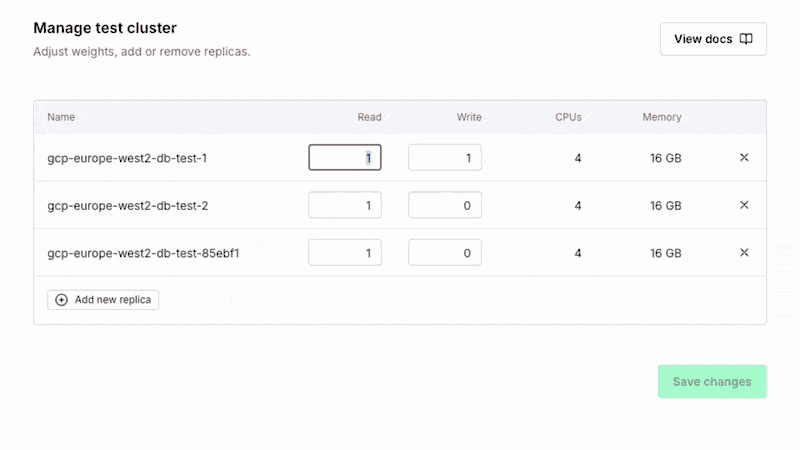We’re excited to announce Self-Serve Replicas in private beta for Tinybird Enterprise customers on dedicate infrastructure. With this release, you can horizontally scale your ClickHouse® cluster by adding or removing replicas and dynamically distributing read/write workloads across them. This is currently available to a limited set of customers via the Tinybird UI (and soon via API) without needing to create a support ticket.
If you would like early access to Self-Serve Replicas for your dedicated infrastructure, please contact support so we can prioritize your cluster during rollout.
Keep reading for more on what this update means for Enterprise customers.
The path to get here
Tinybird's customers operate at considerable scale - some of them process petabytes of data every day serving billions of API requests a month.
Today marks another step in the journey to give Enterprise users more fine-grained control over their infrastructure so they can scale on demand no matter what. Here are some of the additional steps we've taken along the way to make Tinybird more scalable for our largest customers:
Cluster usage monitoring
In November last year, we introduced cluster usage charts for dedicated infrastructure plans. This gave you more visibility into your resource utilization and performance indicators so you could see how your cluster was performing under different workloads.
Of course, this was just observability without control. If you needed to scale your cluster for any reason - a Black Friday sale or a big data migration - you still had to submit a support ticket and then wait for us to do it for you.
Cluster resize request for vertical scaling
In April of this year, we added cluster resize requests in the UI, making it a bit easier for you to request a different machine size for your cluster without manually creating a support ticket.
Compute-compute separation
In June we announced compute-compute separation for populates, allowing Tinybird to automatically spin up dedicated, ephemeral replicas to handle data-intensive populate jobs. This allowed you to run large data backfills, migrations, or materializations without needing to temporarily resize your cluster.
What's new: Horizontal scaling on demand
In addition to all the above, you now have the ability to horizontally scale your ClickHouse® cluster on demand by adding or removing replicas and dynamically balancing your read/write workloads across them.
Add or remove replicas
You can add new ClickHouse® replicas when demand increases and remove them when load returns to normal. When you add a replica, we provision it in your cloud provider (AWS or GCP) and region, replicate your entire dataset, and prepare it to handle production workloads. Any replica can serve any query or handle any ingestion task.

Rebalance read/write loads across replicas
You can control how your workload is distributed across replicas with configurable weights. Set which replica handles ingestion traffic and what percentage of query traffic each replica serves. This lets you assign specialized roles to replicas while maintaining full data replication across the cluster. Every replica has all your data, ensuring no single point of failure. Tinybird maintains complete redundancy while giving you precise control over workload distribution.

Built-in guardrails
The system enforces minimum replica requirements for high availability and ensures ingestion capability is never completely removed from your cluster. You'll get clear explanations if a configuration change would compromise stability, so you can never unintentionally bring down your cluster.
How to get started
Self-Serve Replicas are available in private beta. We're rolling it out to Enterprise customers with dedicated infra on a cluster-by-cluster basis.
Existing Enterprise customers with access
Access the new replica management controls in the Tinybird UI via the Settings → Plan & Billing menu, and clicking Manage Cluster. Your current configuration remains unchanged until you make modifications.
For more info, check out the cluster management documentation.
If you do not yet have access and would like it for your cluster(s), please contact support or ping your dedicated support engineer in Slack so we can prepare your infrastructure and enable the feature.
Not on dedicated infrastructure?
Tinybird's Enterprise plans include dedicated ClickHouse® clusters, more infrastructure control, enhanced security and compliance options, performance SLAs, and dedicated support. If you're interested in upgrading to dedicated infrastructure, contact us.


